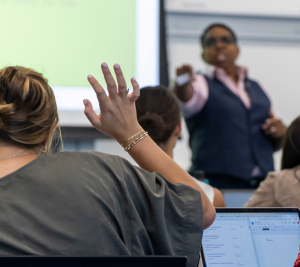By Lacie Blankenship
We’ve all been in at least one of those painful meetings where the speaker asks a question and receives nothing but blank stares and crickets chirping in response. An engaged audience is a strong force behind the impact of any learning experience, and Jen Riley, Senior Lecturer of Marketing at Vanderbilt Business, knows just the strategy to drive student participation in her classes; in fact, Riley was among a team of scholars recognized with the 2023 Innovations in Teaching Award from the Society of Marketing Advances (SMA).

Jen Riley
“This recognition is both an honor and an inspiration,” says Riley. “The award signifies a shared commitment to empowering students and embracing the concept that education is a collaborative and innovative adventure.”
Riley and Priscila Peña, a PhD candidate in marketing at the University of Rhode Island, presented the strategy, “The Participation Competition,” in November at the SMA annual conference in Fort Worth, Texas. A paper on the strategy, written by Riley, Peña, and Nicole Davis, a PhD candidate at the University of Georgia, is published in a special edition of Marketing Education Review on Innovative Teaching.
How can I get my students to participate in class?
The Participation Competition
The Participation Competition is a teaching strategy to increase student participation and learning by turning it into a competitive and engaging activity. One example is to break a classroom of students into groups; the groups operate as teams and can earn points through various participation activities (asking questions, answering questions, adding commentary to discussions, etc.). Teachers can enhance the competition by assigning different values to participation activities and displaying the team scores throughout the course to drive continued engagement.
“The Participation Competition is about instilling a love for learning in students,” says Riley. “We all have so much to learn from each other, and when students are active contributors to a lesson, everyone walks away feeling a stronger and lasting impact.”
How does this strategy encourage participation?
 This strategy encourages students to shift their mindset toward participation by leveraging the principles of gamification, making the learning process more enjoyable and interactive. Students are able to lean in on the intrinsic motivation of being in a dynamic environment.
This strategy encourages students to shift their mindset toward participation by leveraging the principles of gamification, making the learning process more enjoyable and interactive. Students are able to lean in on the intrinsic motivation of being in a dynamic environment.
The strategy was formally tested in marketing courses at the University of Rhode Island and the University of Georgia. The researchers found that students in classes that used the strategy were more engaged than students in classes that did not use the strategy.
Why is participation important?
This research was inspired by the observation that students in a post-pandemic era exhibited lower levels of classroom engagement than their predecessors, reports highlighting the pandemic’s impact on students’ socio-emotional development, and the potential influence of competition on dopamine levels, especially for individuals with ADHD.
“Gone are the days of a teacher or professor standing at the front of the room and lecturing for every class,” says Riley. “Our attention spans are shorter, and there is a need for dynamic learning environments, especially in marketing courses. By implementing this strategy into lesson plans, educators are adapting to today’s students.”
How can I use The Participation Competition outside of teaching?
While The Participation Competition was tested on marketing university students, the strategy can be applied in all areas of academia, regardless of student age. Likewise, the strategy can be adapted in various non-classroom settings to enhance engagement, collaboration, and motivation. Other opportunities to use this strategy include team building, family gatherings, professional development workshops, conference and networking events, community programs, online learning, awards or recognition programs, health and fitness programs, and book clubs.
“Although we present this strategy to benefit marketing classes, leaders of any group for all subjects and age groups can apply it to their presentation,” says Riley. “It’s worth testing this strategy in scenarios outside the classroom since we’re all students in some way!”